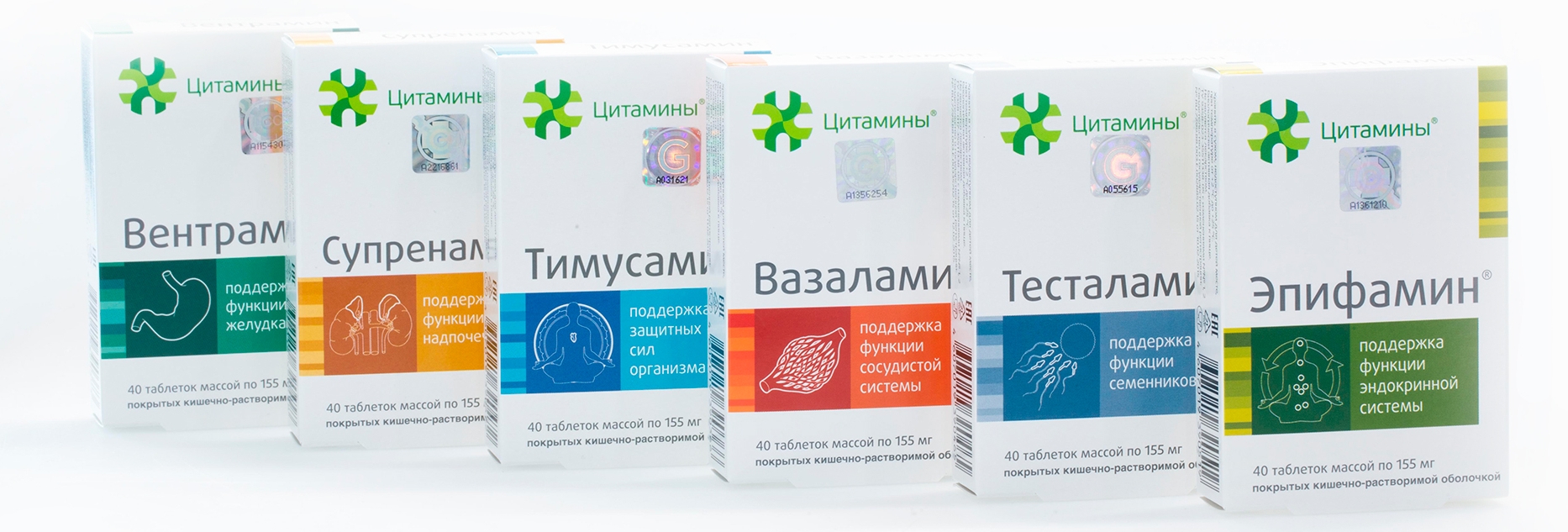Cytamins, Cytomax, Cytogens. What's the Difference?

Peptide bioregulators - a class of biologically active substances were created at the St. Petersburg Institute of Bioregulation and Gerontology, SZO RAMS.
They are used for prophylaxis, auxiliary therapy and maintenance within the physiological limits of the functional activity of organs and body systems.
Peptide bioregulators exist in the form of natural and synthesized complexes - cytogens, cytamins and cytomaxes.
Individual selection of a course of peptide bioregulators allows not only to normalize the body's proper function, but also to slow down its aging. Anyone after 30–40 years old needs two to four courses a year to support the vital functions of the body.
Reviews of peptide bioregulators, in particular, natural cytomax and synthesized cytogens, can be found here.

Cytogens
As a result of many years of scientific research at the St. Petersburg Institute of Bioregulation and Gerontology, SZO RAMS, a new approach to the search for physiologically active peptides has been developed.
Based on the analysis of the amino acid sequence of complexes of polypeptides extracted from organs and tissues of animals, short peptide chains were created, containing from 2 to 4 amino acids.
These chains are copies of the "active sites" of the most significant polypeptides in their group, contained in animal extracts.
This made it possible to create a new class of drugs - collectively called Cytogens.
Since Cytogens, in contrast to extracts (group of polypeptides), contain one type of molecule (the most significant short peptide), they are recommended for use at the initial stages of peptide therapy, as well as for short courses (10 days 3-4 times a year) for the prevention of premature aging.
The use of Cytogens makes it possible to regulate and restore the protective functions of the body, prevent the onset and development of a number of diseases and pathological conditions, and also accelerate the rehabilitation of patients after illnesses. The main effect of new peptide drugs on the human body is the normalization of cellular metabolism in various tissues.
Physiologically active short peptides are advisable to be used as components of food products at any age to maintain a normal level of metabolic processes, prevent and treat various diseases, rehabilitation after serious diseases, injuries, operations, and slow down the aging process.

Cytamins
Cytamines represent the third group of drugs based on tissue-specific regulatory peptides.
Unlike Cytogens Cytamins have a significantly more complex composition, which is due to the peculiarities of their production technology.
Cytamins are secreted from organs and tissues of farm animals - brain, pineal gland, thymus, liver, prostate, heart, bronchi, cartilage, pancreas, blood vessels, stomach, testes, thyroid gland, adrenal glands, kidneys, ovaries, eye tissues.
In the human body, Cytamins act according to the principle of "treating like with like", i.e. they maintain homeostasis and restore the work of those organs from which they are isolated in the animal.
The molecular weight of Cytamins is up to 150 kDa.
Cytamins do not contain preservatives and other substances foreign to the body, have no side effects, have no contraindications, are compatible with other nutrients and medicines, and are also convenient for use.

Cytomaxes
Cytomaxes are the latest generation of peptide bioregulators, the concentration of peptides in them is 2.5-3 times higher than in Cytamins.
Unlike Cytamins, which have impurities in the form of scraps of amino acids from cell nuclei, Cytomaxes contain pure concentrated peptides.
Cytomaxes are natural peptides with an established structure, designed to optimize the functions of the main body systems, obtained from the thymus, cerebral cortex, pineal gland, prostate, liver and other organs, which have a pronounced regulatory effect on the processes of protein biosynthesis in cells of similar tissues.
The molecular weight of Cytomaxes (up to 10 kDa) differs from the molecular weight of Cytamins (up to 150 kDa), which facilitates their passage through the cell membrane.
Therefore Cytomaxes are actively absorbed and accurately reaches the target organ, providing a fast but gentle regulatory action.
Natural peptides develop their action smoothly, since a certain accumulation of peptides (homing effect) is required for tissue response in order to fill the deficit.
The resulting effect from 2 to 4 months of using natural peptides can last from 4 to 6 months. After this period, it is recommended to resume taking peptides.
